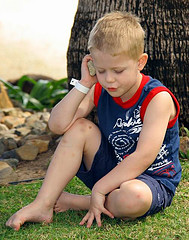- Children being targeted 'behind parents' backs'
- Companies use texts and emails, says Which? report
Some of Britain's leading food companies were yesterday accused of using underhand tactics to directly target children as young as five with information about unhealthy products high in fat, sugar and salt. The consumers' organisation Which? claimed companies were using "viral marketing" such as websites, emails and text messaging to "go behind parents' backs" in promoting their products.
It said it was concerned at glaring "inconsistencies" between companies' official statements of their policies on marketing to children and what they were actually doing. Last week the telecommunications regulator Ofcom announced plans to restrict the television advertising of junk food to youngsters under the age of 16, although it rejected a total ban on all such adverts before a 9pm watershed, which is still demanded by Which? and other consumer and health organisations.
Yesterday Which? published a report which scrutinises the claims made by 12 of the leading food companies on marketing to children, and some of the practices they use.Techniques uncovered by Which? included the Haribo Club, which children can join for £2.99 in order to receive sweets and gifts through the post and news bulletins with competitions. It also expressed concern about "viral marketing", such as the Coco-Pops website where children can register two or more people, if they include their email addresses, to compete to win a trip to Alton Towers.
Among the "inconsistencies" highlighted by Which? is the claim by Masterfoods, which makes Skittles sweets, that "we take special care not to emphasise peer pressure and not to generate pestering". Yet in July this year the Skittles website let teams of boys versus girls compete for Robbie Williams tickets. The site also offered a "buddyPing" account through which children could text their location to Skittles and it would text back the location of their friends.
Nick Stace, campaigns and communications director at Which?, said food marketers were "embedding unhealthy food choices from a very young age and adding to the UK's rising child obesity problems. How can parents be expected to give their children a healthy, balanced diet when these sophisticated, underhand techniques are targeting their children, often behind their backs?"
But the Food Advertising Unit - on behalf of the companies - responded angrily. Sue Eustace, the FAU's director of public affairs, said: "The issue of obesity is extremely important and the industry remains committed to playing its part. However, the solution requires a partnership approach rather than continuous counter-productive battles in the media."
Source: Guardian


No comments:
Post a Comment